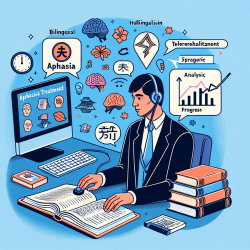Introduction to Data-Driven Discovery
In the realm of online therapy services, especially for children, data-driven discovery is a crucial tool for enhancing therapeutic outcomes. The research article titled "A Preliminary Review of Influential Works in Data-Driven Discovery" provides valuable insights into how data-driven approaches can be applied effectively in various fields, including speech-language pathology. This blog post will explore how practitioners can leverage these insights to improve their skills and outcomes for children.
Understanding the Research
The research conducted by Stalzer and Mentzel (2016) under the Gordon and Betty Moore Foundation's Data-Driven Discovery Initiative highlights the importance of utilizing vast amounts of data to make scientific discoveries. The initiative aimed to foster advancements in data-intensive science by identifying influential works that have shaped the field. This approach is not only applicable to scientific research but also to practical applications in therapy and education.
Key Findings and Their Application
The study identified several clusters of influential works, including methodologies, tools, and the centrality of the scientific method. For practitioners in online therapy, these findings can be translated into actionable strategies:
- Methodologies: Embrace machine learning and statistical methods to analyze therapy session data. This can help in identifying patterns and tailoring interventions to individual needs.
- Tools: Utilize platforms and software that support data collection and analysis. For instance, employing tools like R for statistical analysis can enhance the precision of therapy outcomes.
- Scientific Method: Maintain a rigorous approach to evaluating therapy methods. This involves continuous data collection, hypothesis testing, and adapting strategies based on empirical evidence.
Encouraging Further Research
While the research provides a foundational understanding, it also encourages practitioners to delve deeper into data-driven methods. By staying informed about the latest developments in data science and its applications in therapy, practitioners can continuously improve their skills and the quality of care they provide.
Conclusion
Data-driven discovery offers a powerful framework for enhancing online therapy services. By integrating these insights into practice, speech-language pathologists can achieve better outcomes for children. For those interested in exploring the original research further, please follow this link: A preliminary review of influential works in data-driven discovery.










